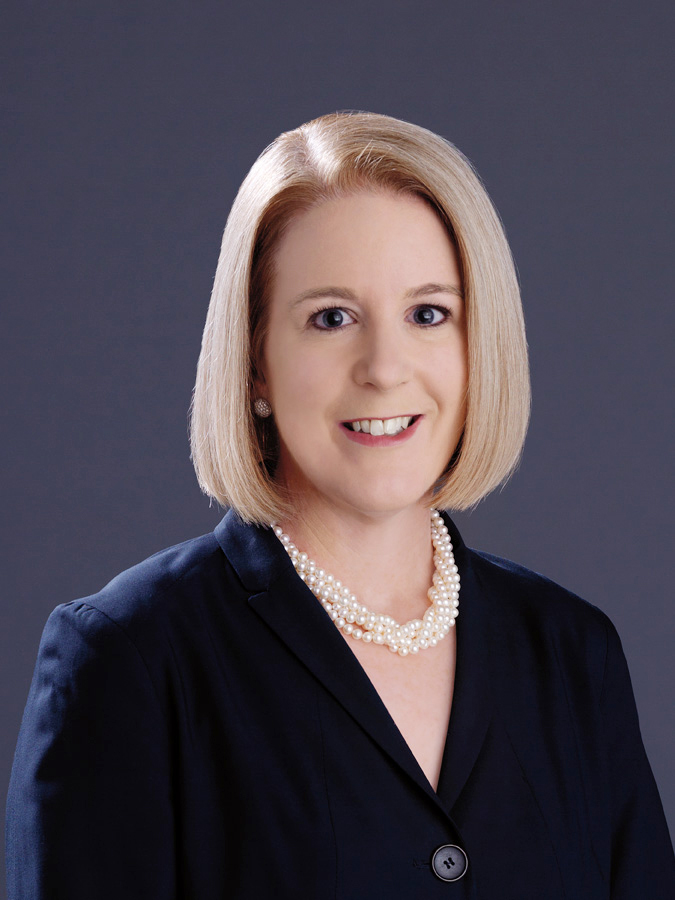
Happy New Year! Thank you for renewing your financial commitment to Washington Women’s Foundation for our 24th year of grant making. We are looking forward to the first meeting of our 2019 Pooled Fund Grant Committee next week and are excited to see how our grant making might shift this year through the application of new criteria focused on increasing equity and reducing disparities in communities throughout Washington State.
This year, we narrowed our criteria to apply to organizations focused on providing services to communities affected by inequity due to race, gender identity, and/or other characteristics historically linked to discrimination and/or exclusion. However, we also asked organizations to explain to us how their expertise in providing services was linked to an understanding of the root causes of the issues facing the community being served. In other words, we asked applicant organizations to place their service provision work in the context of the systems that are negatively impacting their communities, because we know, that unless these systems are changed, philanthropy will be unable to solve the most pressing needs in our community.
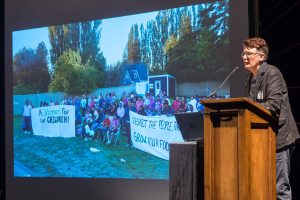
Understanding systems also was the theme of Intersect 2018. Our speakers helped us understand how unhealthy systems can oppress communities, creating or maintaining inequities, especially upon the basis of race. Many of our speakers, now leaders in our community, had personal stories of how systems negatively impacted them and their families and illustrated how systems clearly treat people of color different than white people – even with similar backgrounds and life experiences, white privilege alone secured a more positive path forward.
In sharing her personal story of addiction and homelessness as a young adult, Merf Ehman, now the Executive Director of Columbia Legal Services, noted how the same circumstances that channeled her into the mental health system would have instead placed her in the criminal justice system if she had been not been a white woman.
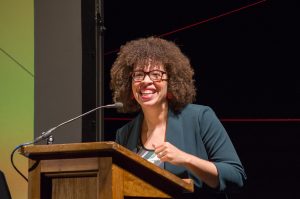
Kirsten Harris-Talley, Program Director at Progress Alliance of Washington, also reflected on the systems that impacted her family. As we prepare to celebrate the passage of the 19th Amendment to the U.S. Constitution, which granted the right to vote to “all women,” Kirsten reminded us that her grandmother, an African American woman living in the South, did not have have full access to that right until the passage of the Voting Rights Act of 1965, 45 years later. In the intervening years (and for years thereafter), political leaders manipulated the political system to suppress the African American vote through the use of poll taxes, literacy tests, and other tactics. As evidenced by what we are learning today about the way our 2016 presidential and 2018 mid-term elections were conducted in some states, 50 years later, we still see voter suppression as a threat to a fully democratic political system.
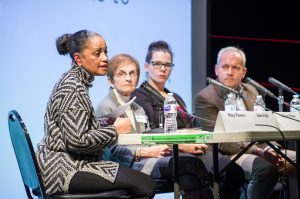
Mary Flowers, a former social worker and now a community organizer, shared with us how her view of systems dramatically changed after she went from working with families in the criminal justice system to being one of those families. Through her work organizing multi-generational, multiracial communities around the juvenile justice system, she has learned that the people who have experienced the system from both sides have the best answers to address gaps in the system and its failures. Ms. Flowers and Ms. Harris-Talley also referenced the 50th Anniversary of the Seattle Chapter of the Black Panther Party, which was founded in response to police brutality but evolved to also address basic failures of local governments to provide what the African American community needed. The Black Panthers, including the Seattle Chapter, initiated school breakfast programs for children, the visibility of which pressured political leaders to permanently authorize the 1975 federal School Breakfast Program (see How the Black Panthers’ Breakfast Program Both Inspired and Threatened the Government on The History Channel).
For Ms. Harris-Talley, the expansion of the work of the Seattle Black Panthers into free breakfasts and prenatal clinics was an example of a community moving from a place of resistance to resilience, communities coming together to solve their own problems. She noted that from El Centro de la Raza to Fort Lawton there are multiple examples where community spaces that exist today are rooted in the power of resistance and in the resilience of the impacted community. She also encouraged us, as philanthropists, to better understand history and the history of resistance, which has changed what we expect from government programs today.
During the course of Intersect 2018, we also tried to look critically at philanthropy’s role in maintaining unhealthy systems with specific inquiry into economics, criminal justice, and health care. Both Ms. Harris-Talley and Ms. Flowers cautioned us against relying too heavily on one of the basic tenets of traditional philanthropy – expediency. Ms. Harris-Talley noted the tendency of funders to set arbitrary time limits for determining success while also failing to consider how we might be unintentionally funding the structural pieces that need to be dismantled. Ms. Flowers reflected on the “devastating” impact competition for grant dollars can have on a community and how the transactional nature of philanthropy creates a “sick cycle” that equates vulnerability with worthiness for funding. Jorge L. Barón, Executive Director of Northwest Immigrant Rights Project, also questioned the dependency upon metrics to gauge success. According to Mr. Barón, we run the risk of replicating the worst parts of the system and marginalizing the communities we are seeking to help by establishing a “competition of numbers that ultimately leads to people being left behind.”
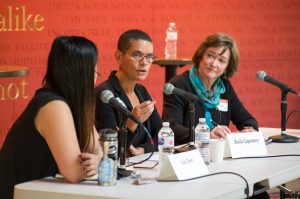
Sheila Capestany, King County’s Strategic Advisor for Children and Youth, encouraged us to consider where there are gaps in government funding and what systems are at play. She said in the area of health, the County funds where people are failing; it funds cures. She encouraged us to look at the bigger picture and consider funding to promote well-being and consider all of the factors that support well-being, including housing, food access, and access to a safe environment.
Retired Justice Bobbe Bridge, the founder of the Center for Children & Youth Justice and a member of Washington Women’s Foundation, encouraged us to look deeper into the history of organizations that we are funding – what needs are they responding to and were the needs identified, collectively, by the individuals and communities impacted? This element of community accountability, repeatedly mentioned throughout Intersect 2018, is another component of our new grant criteria. We are looking to see how applicant organizations are drawing on the strengths and assets of the communities being served and how those communities are being engaged in ongoing decision-making, planning, and assessment if they are not in fact leading the work.
Almost all of our speakers encouraged us to invest more in civic engagement, community organizing, movement-building, capacity-building, and advocacy. As previously mentioned, we also were encouraged to listen to communities and to let them lead – as noted by one speaker, grant makers should be followers of communities, not charging in on “white horses” with dollars and ideas about how work should be done. Speakers asked us to go out into communities to build authentic, trust-based relationships, something our current process of grant making does not truly facilitate.
Intersect 2018 was another intellectually challenging day, which inspired many of our members to think differently about how and what we fund. If you were not able to join us, I encourage you to listen to some audio recordings from the day before you mark your ballot this coming May. Also, think about how you engage in your personal philanthropy and what communities you are building relationships with as you make funding choices. What factors are driving your choices and what “metrics” are you using to evaluate success? And if you would like to join us in collectively applying our new grant making criteria this year, it’s not too late to join the Pooled Fund Grant Committee. I look forward to seeing you this new year!
Thank you Beth for such a robust synopsis. I’m sorry to have missed this year of membership but know 2019 will bring many opportunities for learning.